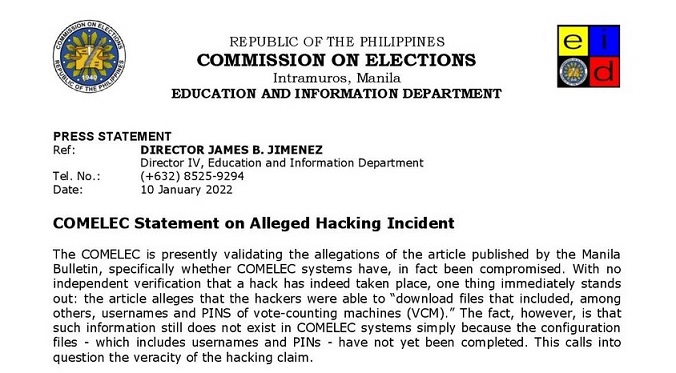So many things were not quite right in the Manila Bulletin news report about the alleged hacking of the Commission on Election (Comelec) website. The quick response from Comelec Spokesperson James Jimenez foiled further spread of that suspicious report.
Jimenez took the bull by its horn, a valuable lesson not only in fighting disinformation but also in preventing something from becoming a problem, or a crisis.
The report came to our attention late afternoon of Monday, Jan. 10. It said “sensitive voter information may have been compromised after a group of hackers was allegedly able to breach the servers of the Commission on Elections (Comelec), downloading more than 60 gigabytes of data that could possibly affect the May 2022 elections.”
“This was discovered by the Manila Bulletin (MB) Technews team, which found that the hackers’ group managed to breach the system of the Comelec last Saturday, Jan. 8, 2022, and download files that included, among others, usernames and PINS of vote-counting machines (VCM),” the MB article continued.
The story had the byline “MB Technews,” indicating that not one person but members of the newspaper’s technews team worked on the story.
The report triggered concern because this was not the first time that government agencies’ websites, including Comelec’s, were hacked. And there’s the approaching May 9, 2022 elections that everyone looks forward to as the campaign heats up even as the Omicron variant of COVID-19 rampages, setting new record levels of infections.
Our fact-checkers’ training tell us to immediately do lateral reading, get out of the Manila Bulletin site and check if other news media sites carried similar reports. Nada!
We got Jimenez’ statement, which said they were “validating” the news report. He did not dismiss the report outright but pointed out red flags.
“With no independent verification that a hack has indeed taken place, one thing immediately stands out: the article alleges that the hackers were able to ‘download files that included, among others, usernames and PINS (personal identification numbers) of vote-counting machines (VCM).’The fact, however, is that such information still does not exist in Comelec systems simply because the configuration files – which includes usernames and PINs – have not yet been completed. This calls into question the veracity of the hacking claim,” Jimenez noted.
Further, he said: “ As for the rest of the allegations made, please note that the article offers scant substantiation for its assertions despite claiming that the authors had ‘verified that there was an ongoing hack.’ Indeed, the article does not even offer proof of such verification.”
As expected, several theories and comments already came out on social media. There were those who suspected those loyal to President Rodrigo Duterte of sabotaging the May 9 elections for a No-EL scenario to allow him to stay in Malacañang beyond June 30, 2022.
The seed of this suspicion could have been the proposal of Rep. Aurelio Gonzales Jr. (Pampanga, 3rd district), filed on Jan. 7, for longer term of office for the president, members of the House of Representatives and local officials on the argument that six years for a president and three years for House members are “too short.”
Later in the evening, we chanced upon this Twitter account @KimInar by someone who described herself as a “world traveler, lawyer, critic, hard-working, and independent woman.”
Earlier, @KimInar was at a Twitter party with the theme “Protect our Vote” and hashtag #ComelecHacked. It carried the Manila Bulletin headline report.
@KimInar tweeted: “Can we still entrust our vote with the Comelec?” and encouraged others to “RT.”
Jose@edsaisidro wrote: “So if not for the MB Technews team, we wouldn’t have known this hacking incident? Talagang nanakawin ulit ang mga boto natin?”
Anathema Crapolla@anathemacrapola chimed in: “This plus yung pang tatag team ni Jimenez at Guanzon ng tweets para hiyain si Bongbong sa dapat walang kwentang DQ issue, plus yung cryptic tweet ni Andy Bautista…… Ano ba ito? Harap harapang pangaggago? Eleksyon pa ba? Bigay nyo na kay Leni. Nahiya pa kayo.”
Did the Manila Bulletin news report have something to do with the petitions to disqualify presidential candidate Ferdinand “Bongbong” Marcos, Jr. being heard by the Comelec First Division?
Comelec Commissioner Rowena Guanzon started the hearing Jan. 7, Friday. Marcos Jr. did not attend. His lawyer said he was not feeling well and that he was exposed to persons who tested positive of COVID-19.
Guanzon announced on Twitter: “On or before Jan 17 the @COMELEC First Division will promulgate its Resolution on the DQ cases versus Marcos Jr. If not too risky, we will read it in the Session Hall, on live stream.
This column appeared also in:

Be First to Comment